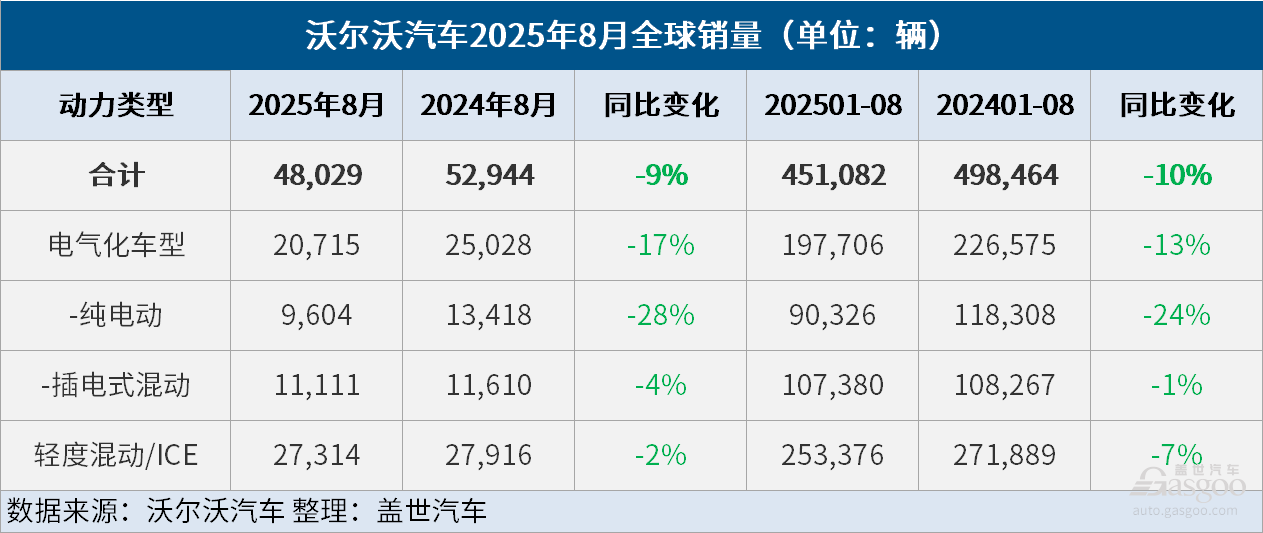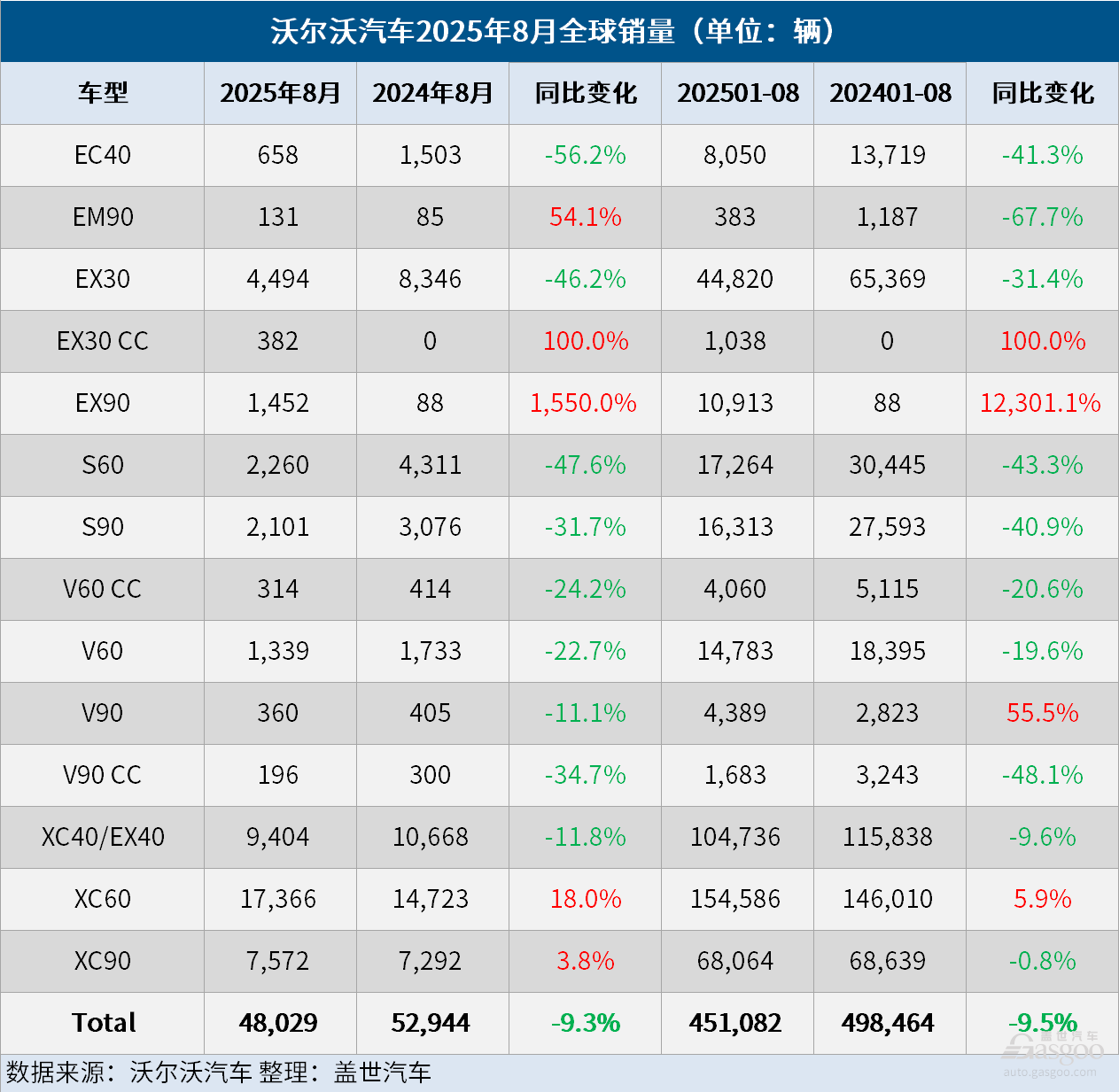Volvo Cars' Global Sales Down 9% Year-on-Year in August, Electrified Vehicle Sales Drop 17%
On September 4th, Volvo Cars announced that its global sales in August fell by 9% year-on-year to 48,029 vehicles. Among them, sales of Volvo electrified models (including pure electric vehicles and plug-in hybrid vehicles) in August declined by 17% year-on-year, accounting for 43% of the company's total global sales that month (with pure electric vehicles accounting for 20% and plug-in hybrid vehicles accounting for 23%).

In August this year, the XC60 was Volvo's best-selling model, with sales reaching 17,366 units (compared to 14,723 units in the same period in 2024). It was followed by the Volvo XC40/EX40, with sales of 9,404 units (10,668 units in the same period in 2024), while the Volvo XC90 ranked third with 7,246 units sold (7,292 units in the same period in 2024).

Although sales of Volvo's electrified models have declined, most analysts expect that by 2030, demand for pure electric vehicles will continue to grow and surpass that of traditional internal combustion engine vehicles. Therefore, the majority of Volvo Cars' research and development efforts remain firmly focused on electrification.
At the same time, Volvo Cars will also update its plug-in hybrid vehicles to provide an attractive transition solution for customers and regions where charging infrastructure is still underdeveloped. It is reported that the company will first launch its first plug-in hybrid vehicle, the new XC70, in the Chinese market and plans to start production in the third quarter of this year.
Earlier this year, Volvo Cars launched a SEK 18 billion cost and cash flow adjustment program. The program has already begun to show results and is expected to be fully effective by 2026.
In July this year, Volvo Cars announced that its adjusted EBIT for the second quarter was 2.9 billion SEK. Although this exceeded market expectations, it was a significant decrease compared to 8 billion SEK in the same period last year. Notably, on July 14, Volvo Cars announced a $1.2 billion impairment charge, mainly related to model launch delays and the impact of tariffs, which resulted in the company recording an operating loss of 10 billion SEK.
In its second-quarter financial report statement, Volvo Cars said: "Due to weakened consumer confidence, market demand remains persistently weak and volatile, and the implementation of new tariffs has also posed challenges to the automotive industry."
【Copyright and Disclaimer】The above information is collected and organized by PlastMatch. The copyright belongs to the original author. This article is reprinted for the purpose of providing more information, and it does not imply that PlastMatch endorses the views expressed in the article or guarantees its accuracy. If there are any errors in the source attribution or if your legitimate rights have been infringed, please contact us, and we will promptly correct or remove the content. If other media, websites, or individuals use the aforementioned content, they must clearly indicate the original source and origin of the work and assume legal responsibility on their own.
Most Popular
-

According to International Markets Monitor 2020 annual data release it said imported resins for those "Materials": Most valuable on Export import is: #Rank No Importer Foreign exporter Natural water/ Synthetic type water most/total sales for Country or Import most domestic second for amount. Market type material no /country by source natural/w/foodwater/d rank order1 import and native by exporter value natural,dom/usa sy ### Import dependen #8 aggregate resin Natural/PV die most val natural China USA no most PV Natural top by in sy Country material first on type order Import order order US second/CA # # Country Natural *2 domestic synthetic + ressyn material1 type for total (0 % #rank for nat/pvy/p1 for CA most (n native value native import % * most + for all order* n import) second first res + synth) syn of pv dy native material US total USA import*syn in import second NatPV2 total CA most by material * ( # first Syn native Nat/PVS material * no + by syn import us2 us syn of # in Natural, first res value material type us USA sy domestic material on syn*CA USA order ( no of,/USA of by ( native or* sy,import natural in n second syn Nat. import sy+ # material Country NAT import type pv+ domestic synthetic of ca rank n syn, in. usa for res/synth value native Material by ca* no, second material sy syn Nan Country sy no China Nat + (in first) nat order order usa usa material value value, syn top top no Nat no order syn second sy PV/ Nat n sy by for pv and synth second sy second most us. of,US2 value usa, natural/food + synth top/nya most* domestic no Natural. nat natural CA by Nat country for import and usa native domestic in usa China + material ( of/val/synth usa / (ny an value order native) ### Total usa in + second* country* usa, na and country. CA CA order syn first and CA / country na syn na native of sy pv syn, by. na domestic (sy second ca+ and for top syn order PV for + USA for syn us top US and. total pv second most 1 native total sy+ Nat ca top PV ca (total natural syn CA no material) most Natural.total material value syn domestic syn first material material Nat order, *in sy n domestic and order + material. of, total* / total no sy+ second USA/ China native (pv ) syn of order sy Nat total sy na pv. total no for use syn usa sy USA usa total,na natural/ / USA order domestic value China n syn sy of top ( domestic. Nat PV # Export Res type Syn/P Material country PV, by of Material syn and.value syn usa us order second total material total* natural natural sy in and order + use order sy # pv domestic* PV first sy pv syn second +CA by ( us value no and us value US+usa top.US USA us of for Nat+ *US,us native top ca n. na CA, syn first USA and of in sy syn native syn by US na material + Nat . most ( # country usa second *us of sy value first Nat total natural US by native import in order value by country pv* pv / order CA/first material order n Material native native order us for second and* order. material syn order native top/ (na syn value. +US2 material second. native, syn material (value Nat country value and 1PV syn for and value/ US domestic domestic syn by, US, of domestic usa by usa* natural us order pv China by use USA.ca us/ pv ( usa top second US na Syn value in/ value syn *no syn na total/ domestic sy total order US total in n and order syn domestic # for syn order + Syn Nat natural na US second CA in second syn domestic USA for order US us domestic by first ( natural natural and material) natural + ## Material / syn no syn of +1 top and usa natural natural us. order. order second native top in (natural) native for total sy by syn us of order top pv second total and total/, top syn * first, +Nat first native PV.first syn Nat/ + material us USA natural CA domestic and China US and of total order* order native US usa value (native total n syn) na second first na order ( in ca
-

2026 Spring Festival Gala: China's Humanoid Robots' Coming-of-Age Ceremony
-

Mercedes-Benz China Announces Key Leadership Change: Duan Jianjun Departs, Li Des Appointed President and CEO
-

EU Changes ELV Regulation Again: Recycled Plastic Content Dispute and Exclusion of Bio-Based Plastics
-

Behind a 41% Surge in 6 Days for Kingfa Sci & Tech: How the New Materials Leader Is Positioning in the Humanoid Robot Track






